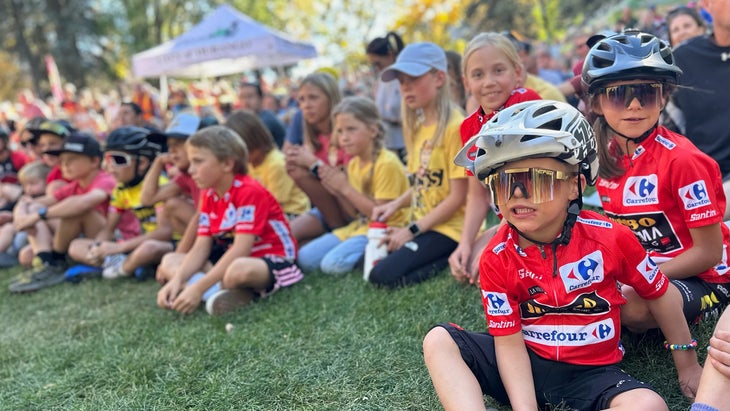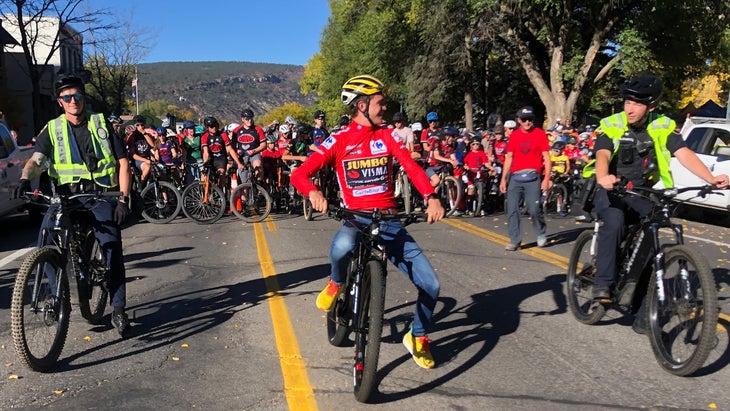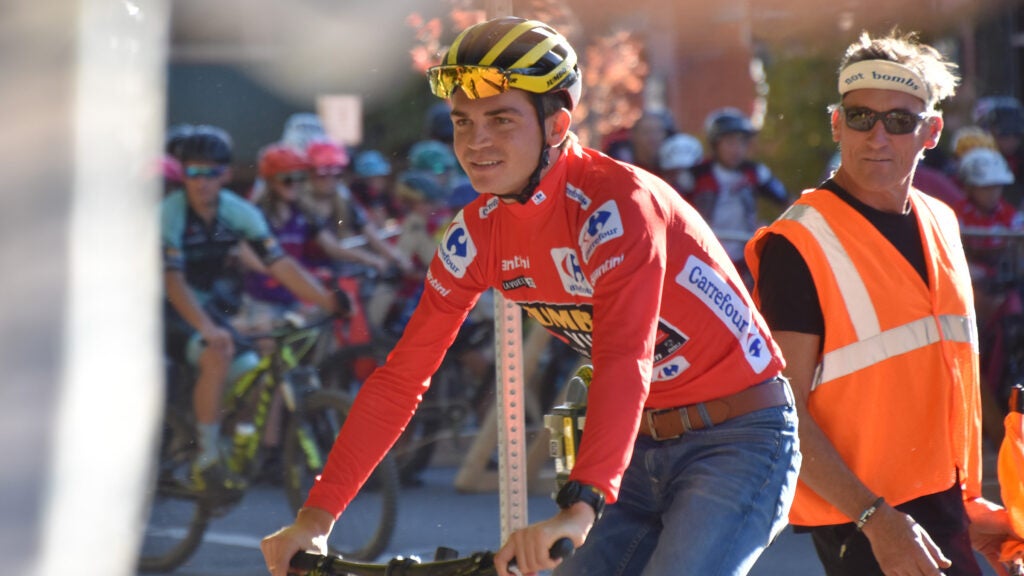No products in the cart.
Outdoor Adventure
Sepp Kuss Is Already Inspiring Young Cyclists in His Hometown
The line to meet American cyclist Sepp Kuss stretched out of Buckley Park and across 13th street and continued past several rows of shops lining Main Avenue in downtown Durango, Colorado on Thursday, October 19. Clad in a jersey for the local Durango DEVO mountain bike team, 12-year-old Maggie Foose told me that she didn’t care how long she had to wait to meet Kuss, who grew up in town. She had watched him race the Tour de France this past July, and had read about his historic victory at the Vuelta a España. Now, Maggie and her mom, Emily, intended to ask Kuss to autograph her jersey.
“I like that he grew up in Durango and how alot of people know him, and that he’s so famous in this town,” Maggie told me. “I think it’s so cool they let us ride with him in a parade.”

Several dozen spots behind Emily, eight-year-old Van Di Bernardino hopped up and down alongside his mother, Joanna. Van proudly showed me his new T-shirt, emblazoned with a Sepp Kuss caricature smiling aboard a bicycle. “I like that he never gives up and he keeps smiling,” Van said. Near Van, the Kleinsmith family also waited to meet Kuss. Five-year-old Will and eight-year-old Mason wore matching red bike kits—styled after the Vuelta’s leader jersey. “The cycling culture in Durango is so special,” their father, Baird Kleinsmith, told me. “Look how many people this has brought together.” A few minutes later, I saw Will and Mason running through the park showing off the Sepp Kuss autographs on their red jerseys. “That was so cool!” Mason Kleinsmith shouted.
Approximately 2,000 people—many of them children—turned out on Thursday afternoon for a festival and parade in downtown Durango to honor Kuss. In September, he won the Vuelta a España, becoming the second American to win the event and just the fourth to ever win one of cycling’s three Grand Tours. The win reverberated in Durango.
Celebrating Sepp Kuss! Share your favorite picture from today’s celebration in the comments below! pic.twitter.com/YjZwITaxyo
— City of Durango (@CityofDurango) October 19, 2023
Kuss lives in Andorra full-time but maintains his connection to the Durango DEVO—his former coach, Chad Cheeney, is the co-founder, and his close friend, Levi Kurlander, is the current director. After Kuss secured his Vuelta victory on September 17, Kurlander and Cheeney brainstormed ways to honor their friend’s historic win in town. Kuss planned to visit his parents, who still live in Durango, in mid-October, and Kurlander and Cheeney set to work organizing a party.
“We started three weeks out,” Kurlander said. At first, Kurlander thought about doing a small meet-and-greet on the nearby Fort Lewis College campus. But in late September he sent out an email and social media post to the Durango DEVO community about a possible Sepp Kuss event. “We got 3 million social impressions in the first few days,” Kurlander said. “As soon as we put out that first email we knew it wasn’t going to be chill.”
Kurlander created a small organizing party of event producers. They secured a stage, food trucks, live music, and entertainment, and the proposed their plan to the City of Durango just two weeks before the celebration date. The plan called for a bike parade through downtown, starting and finishing at Buckley Park. Durango Mayor Melissa Youssef told me she fast-tracked the plan, approving permits for police escorts and road closures. “We were all-in,” she said. “Sepp embodies the values of our community and we wanted to support him as best as we can.”
The festival was slated to kick off at 3:30 P.M. on Thursday afternoon, but people stopped by well before then. I strolled across the grass at Buckley Park and saw multiple notable cyclists from Durango’s past and present. Ned Overend, the 1990 mountain bike world champion, stood in a corner near retired Olympian Travis Brown and Greg Herbold, the first person to ever win a world title in downhill mountain biking. Three-time Olympian Todd Wells shook hands with friends. Priscilla Blevins, whose son, Christopher, recently raced in the Olympics for Team USA, volunteered to shepherd crowds in and out of the park. Sepp’s mother, Sabina Kuss, walked the family dog along the grass. Volunteers distributed prints of a painting she had done of Sepp aboard his time trial bike, and passersby grabbed copies as mementos.
Longtime racing announcer Dave Towle took the stage to warm up the crowd at 3:30 P.M. “The eagle of Durango has landed!” Towle screamed. Mayor Youssef went next. “It’s very likely that the next world champion is here in the audience today,” she said. I stood near the stage and looked behind me—I saw row after row of children screaming, many of them wearing the team colors of Jumbo-Visma, Kuss’s WorldTour squad.

Behind the kids stood thousands of adults. They had created all manners of off-brand T-shirts to honor Kuss. One design said “KUSS ARMY” and was styled to look like the logo of the rock band KISS. Another had a blown-up image of Kuss’s face. A group of students from nearby Fort Lewis College draped American flags around their necks with a photo of Kuss silkscreened over the red-and-white stripes. One of the students, Jake Orlander, 20, said his affinity for Sepp Kuss wasn’t simply due to his wins.
“It really seems like he is into the fun aspect of cycling,” Orlander said. “He seems like he actually enjoys it and not just because he’s winning.”
Tour de France cyclists are known for their monastic lifestyles of training, rest, and diet. Athletes focus on marginal performance gains and on precision—fun usually takes a back seat. Riding up long, grinding climbs is painful, and often times the best racers are those who can suffer the hardest. Yet Kuss bucks the trend of the hardened racer—cameras usually show him smiling in the peloton. During his Vuelta win, he regularly congratulated rivals who beat him. Kuss’s racing attitude was not lost on the crowds in Buckley Park.
“He races like he’s having a blast,” said Richard Clearbout, 65, a concrete finisher. “It’s the Durango mentality.”
Durango mentality or not, Kuss’s outward appearance of fun and enjoyment could help more young cyclists pursue the sport. Across the country, youth programs like Durango DEVO and the National Mountain Bike Association have attracted kids to the sport in throngs. Cycling fans—and media members—hope that the influx will filter more talented kids upward toward the professional ranks. But nothing can sell a sport to kids quite like a hero—and American cycling hasn’t had a bonafide Tour de France contender in decades. Kuss’s win has elevated him to that status. He may become the star athlete who opens the floodgates for cycling participation.
Kuss took the stage and thanked the thousands for coming to honor him. “It’s been an incredible homecoming,” he said, before introducing his wife, Noemi, and parents, Dolph and Sabina.
After the speeches and stories, Kuss climbed aboard a mountain bike on Main Avenue. Behind him, more than 1,000 cyclists queued up. A police escort slowly drove through Main Avenue, with Kuss and the throngs of others pedaling slowly behind. I watched the procession from the sidewalk. Locals rode past us on road bikes, mountain bikes, e-bikes, tandems, and wide tricycles. Some carried dogs, others wore costumes.
Darting between the adults were children aboard striders and bikes with training wheels. The line of kids on bikes seemed to go on forever.

